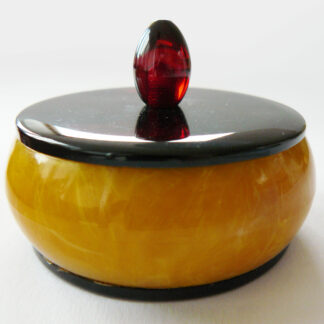Catalin
Catalin is a brand name for a thermosetting plastic popular in the 1930s. Chemically, it’s a phenol formaldehyde resin. Catalin is a cast bakelite product, with a different manufacturing process (two-stage process) than other types of bakelite resins (without using fillers such as sawdust or carbon black). Catalin is transparent, near colourless, rather than opaque, brown, so unlike other bakelite phenolics it can be dyed bright colours or even marbled. This has made Catalin more popular than other types of bakelite. In the 1930-50’s it quickly replaced most plastic consumer goods. The many way of using plastics in everyday life as well as their impulses for modern design took fully effect, though, only after World War II. The 1930s plastics lend themselves to ultra-modern living and also to flashy design. Catalin was not a durable product. It tended to shrink and crack as it aged. Also, due to oxidation, it changed colour as it aged. This caused some every interesting effects when radio cabinets were made from Catalin. Catalin is a trademark of the American Catalin Corporation. Catalin cast bakelite is perhaps the most worldwide recognized plastic used in fashion accessories and fine, expensive jewellery. Catalin radios are highly sought after by collectors.
Showing all 2 results
-

Bakelite Box, Art Déco, France, 1930s
EUR 240,00 inkl. MwSt.
Includes 19% Mwst.plus shippingRead more -

Island with palm trees and elefant, Catalin, New York, 1930s
EUR 550,00 inkl. MwSt.
Includes 19% Mwst.plus shippingAdd to cart
Showing all 2 results
